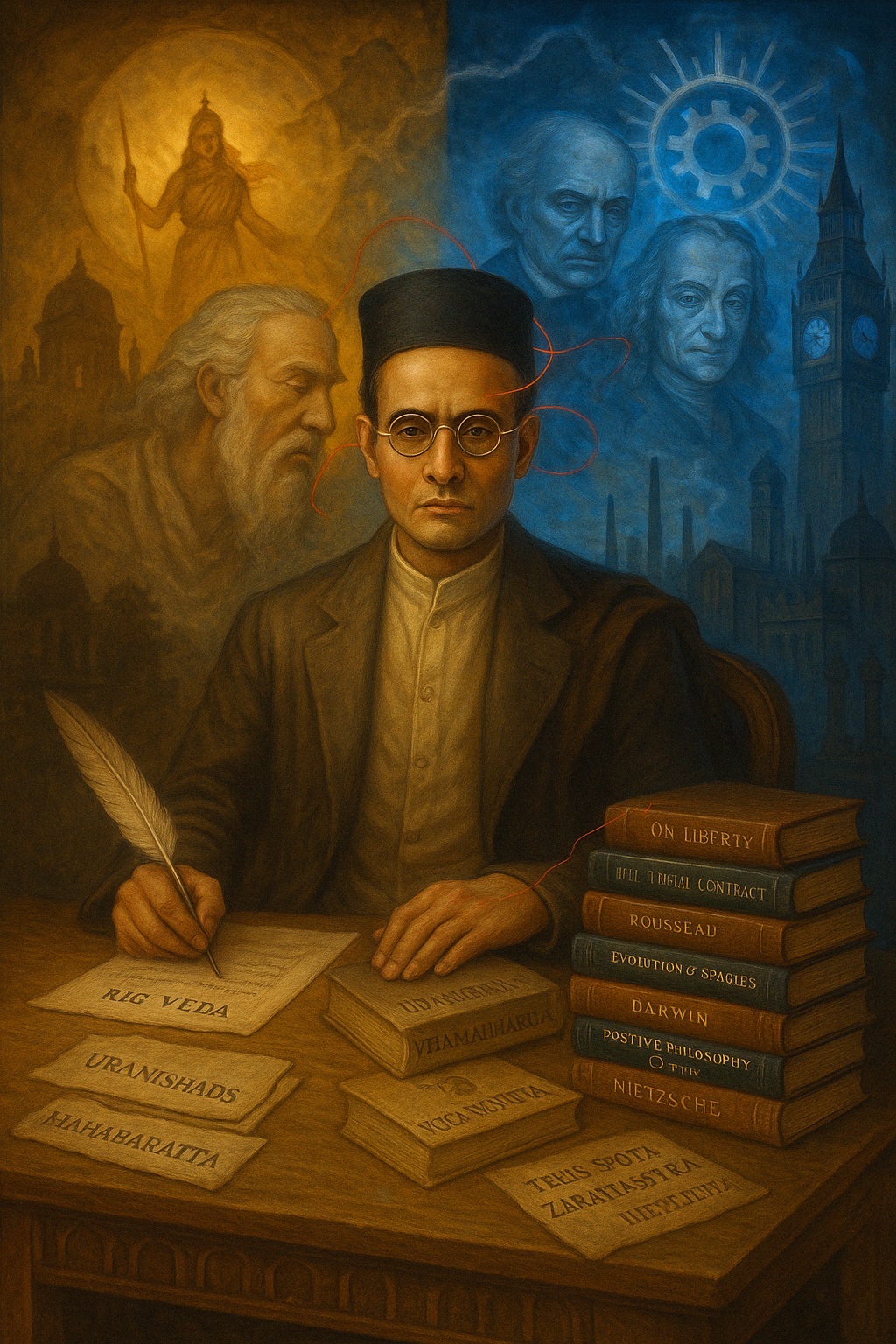Savarkar’s Philosophy & Worldview, Part 2
Vinayak Damodar Savarkar derived his philosophy from a wide range of sources, both Indian and Western. While his deep engagement with ancient Hindu scriptures is well-documented, his philosophical orientation was significantly shaped by Western socio-political and philosophical thought. This influence played a crucial role in shaping his worldview, making it essential to consider Western ideologies when analyzing his social and political beliefs.
Savarkar’s Engagement with Indian Classical Thought
Contrary to the assertion that Savarkar had little interest in traditional Hindu philosophical schools, his writings suggest otherwise. During his imprisonment in the Andamans, he immersed himself in sacred Hindu texts, including the Upanishads, the Rig Veda, the Ramayana, the Mahabharata, the Brahma Sutras, and various other classical texts. He himself described his experience with the Yoga Vashishta as profoundly moving and intellectually stimulating, considering it one of the finest works on Vedanta philosophy (Savarkar 1950:272).
However, despite this engagement, Savarkar’s socio-political thought was not fundamentally driven by Hindu theological traditions. Instead, his philosophy was significantly influenced by the socio-political and scientific ideas emerging from the West.
Western Influences on Savarkar’s Political and Social Thought
Savarkar was deeply inspired by Western thinkers, particularly those advocating liberalism, rationalism, and scientific progress. The works of James Mill and John Stuart Mill profoundly shaped his ideas on individual liberty, democracy, and governance. He also studied Herbert Spencer extensively, especially Spencer’s evolutionary philosophy, which postulated that all phenomena adhere to the “law of evolution” (J. Sharma 2003:136).
Spencer’s influence extended to Savarkar through Shyamji Krishna Varma, who was both an admirer of Spencer and an early mentor to Savarkar. Spencer’s philosophy of evolution and survival of the fittest resonated with Savarkar, influencing his ideas on national strength and self-sufficiency. This principle can be observed in his conceptualization of India’s future role as a unified and powerful state in global affairs. Here, B.K. Kelkar (1989:59) refers to Savarkar by underpinning that only a homogeneous society can form an integrated Bharat. And only such a Bharat can triumph in the global power struggle. The obligation to become a superpower was the only way to keep this vast country united and dynamic.
Savarkar’s Pancha Sheela: The Blueprint for National Revival
Savarkar’s approach to socio-political renewal was structured around five guiding principles, collectively known as Pancha Sheela:
- Hinduization of Politics – The infusion of Hindu cultural identity into political structures.
- Militarization of Hindutva – Advocating for a strong and self-reliant Hindu society.
- Regulated Electoral Reforms – Promoting democratic values through structured electoral participation.
- Practice of Patriotism – Fostering a deep sense of national duty and commitment.
- Establishment of a Casteless Society – Striving towards social unity beyond caste divisions.
These principles demonstrate his strategic synthesis of Indian nationalism with Western political ideologies. While Pancha Sheela reflected his commitment to Indian resurgence, it also incorporated Western concepts of democracy, social cohesion, and nationalism.
Philosophical and Intellectual Influences
Savarkar was not just a political thinker but also a voracious reader. His personal library in the Andaman prison reflected his intellectual pursuits. It included works of Western philosophers, historians, and social theorists, such as:
- Political Thinkers: John Stuart Mill, Rousseau, Jeremy Bentham, Voltaire.
- Sociologists & Evolutionists: Herbert Spencer, Charles Darwin, Auguste Comte.
- Historians & Leaders: Macaulay, Gibbon, Napoleon, Bismarck, Garibaldi, Mazzini.
- Poets & Writers: Shakespeare, Milton, Tolstoy, Emerson, Carlyle.
- Indian Reformers: Vivekananda, Rama Tirtha.
- Philosophers: Aristotle, Plato, von Treitschke, Nietzsche.
Savarkar claimed that he read all these books. Not a single book in the library was left unread by him. He had read some of them multiple times, and he had urged his colleagues to study works on politics, political history, and economics with heightened attention. (Savarkar 1950:270).
This extensive reading shaped his perspectives, blending the rationalism and scientific spirit of the West with the cultural ethos of India. His admiration for the French Revolution, drawn from Rousseau and Voltaire, reflected in his advocacy for radical national and social change.
Final Thoughts: The Unique Synthesis of Thought
Savarkar’s worldview was a remarkable synthesis of Indian and Western thought. While deeply rooted in Hindu culture and history, his ideas on nationalism, democracy, and social progress were influenced by European thinkers. He rejected rigid religious orthodoxy and embraced rationalism, pragmatism, and social transformation.
His ideological framework was neither purely Western nor entirely traditionalist but a fusion of diverse intellectual currents. This nuanced approach makes Savarkar’s legacy complex yet profoundly influential in shaping modern Indian political thought.
Sources:
LEDERLE, Matthew. 1976. Philosophical Trends in Modern Maharashtra. Popular Prakashan: Bombay (Mumbai).
SAVARKAR, Vinayak Damodar. 1950. The story of my transportation for life. Sadbhakti Publications: Bombay.
SHARMA, Jyotirmaya. 2003. Hindutva. Exploring the Idea of Hindu Nationalism. Viking/Penguin Books: New Delhi.
SRIVASTAVA, Harindra. 1983. Five stormy years: Savarkar in London (1906-1911) – A centenary salute to V.D. Savarkar. Allied: New Delhi.


Leave a Reply